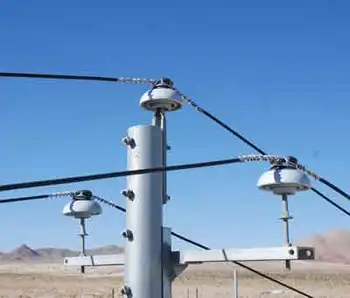State sues utility for U.S. pollution violations
By Pittsburgh Post-Gazette
Protective Relay Training - Basic
Our customized live online or in‑person group training can be delivered to your staff at your location.

- Live Online
- 12 hours Instructor-led
- Group Training Available
State Department of Environmental Protection Secretary Kathleen McGinty said the lawsuit's goal is to make the Greensburg-based electricity producer significantly reduce emissions of smog and acid- rain-producing pollutants at three power plants in Pennsylvania and five in West Virginia.
The lawsuit filed in U.S. District Court in Pittsburgh claims that the company made modifications to the power plants without installing modern pollution controls as required by federal law and without getting state approval for the work.
"We are calling on Allegheny Energy to put in place equipment and operational changes that will enable its plants to perform in a manner that meets the highest standards for environmental protection," McGinty said. "We hope Allegheny Energy will work with us expeditiously to clean up their plants and protect public health."
The Pennsylvania power plants named in the lawsuit are the Hatfield's Ferry plant on the Monongahela River in Greene County near Masontown; the Armstrong power plant in Adrian, Armstrong County; and the Mitchell power plant in Courtney, Washington County.
Allegheny Energy issued a statement saying it was moving forward with environmental improvements, is disappointed by the lawsuit and is in compliance with all federal regulations.
Previous investigations by the U.S. Environmental Protection Agency found Allegheny Energy made major improvements and operational changes at several of its coal-fired power plants without installing pollution controls. But in 2003, the EPA dropped its investigation of the company and 50 other air pollution investigation cases.
According to the DEP, which picked up the federal investigation, Allegheny Energy violated the state's Air Pollution Control Act and the federal Clean Air Act's New Source Review program. Its provisions require major new or modified factories and power plants to install modern pollution controls when they make changes that may increase pollution.
"When the federal government dropped its cases, it didn't make a ruling and we still believe that these facilities are in violation of the Clean Air Act," said Kurt Knaus, a state DEP spokesman.
Allegheny Energy, which provides power to 650,000 customers in Pennsylvania and owns and operates 23 power plants in the United States, is the fifth-largest emitter of sulfur dioxide and the 10th- largest emitter of nitrogen oxides in the nation.
"We consider this new action unnecessary, given our pending lawsuit in West Virginia and our plans to reduce the absolute level of emissions at our power plants," said Paul Evanson, chairman, president and chief executive officer. "We are moving forward as rapidly as our financial condition allows."
In January, after Pennsylvania and other states filed a notice of intent to sue, Allegheny Energy went to U.S. District Court in West Virginia seeking a pre-emptive ruling that its power plants meet all federal air pollution standards. That case has not been heard.
The West Virginia power plants named in the lawsuit are Albright in Albright; Fort Martin in Maidsville; Harrison in Haywood; and Pleasants and Willow Island, both in Willow Island.
In the past few months, the company, which came close to seeking bankruptcy protection two years ago, has said it could not afford to install modern pollution controls, which could cost as much as $400 million per power plant.
Its Hatfield's Ferry and Armstrong plants, which do not use the smokestack scrubbers that have been common pollution controls on power plants since the 1970s, were among the 10 biggest emitters of sulfur dioxide in the nation last year.
Sulfur dioxide and nitrogen oxides help form fine airborne particles and soot, which trigger asthma attacks and cause lung and heart disease linked to more than 20,000 premature deaths a year.
Allegheny Energy spokesman Allen Staggers said the company is mixing low-sulfur western coal with its eastern coal at Hatfield's Ferry and Fort Martin to substantially reduce annual sulfur dioxide emissions.
Hatfield's Ferry, a 35-year-old power plant with a generating capacity of 1,710 megawatts, also emits large amounts of mercury. In February, Citizens for Pennsylvania's Future, a statewide environmental group that's also called PennFuture, sued Allegheny Energy in federal court for violations of that plant's soot and smoke control emissions limits on 1,635 days from 1999 through 2003.
"It's about time," Charles McPhedran, PennFuture attorney, said of yesterday's filing by the states. "But DEP has yet to take any action to abate the soot that's been falling on people who live near that plant."
McPhedran said the DEP and Connecticut, New Jersey and New York filed notice of intent to sue Allegheny Energy in May 2004, and could have filed a lawsuit 60 days later.
"I'm glad they're in," McPhedran said, "and I hope they pursue a strong remedy."











